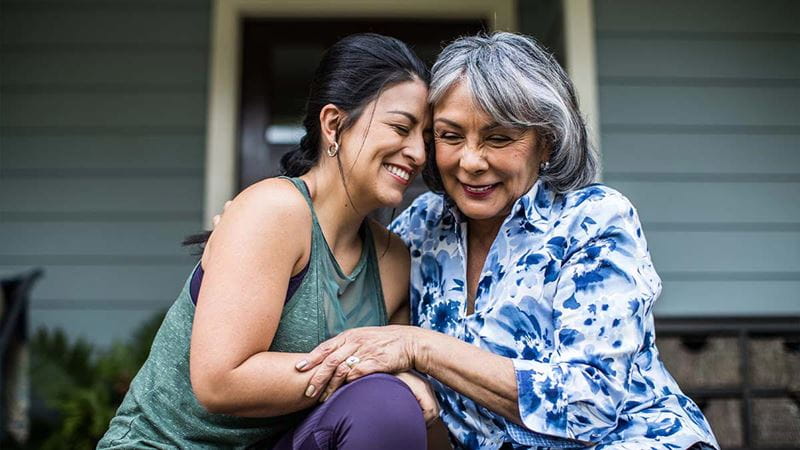Blog article
Am I just worried, or is it anxiety?

Anxiety is a natural and healthy response to situations we perceive as potentially harmful. However, when these feelings become more regular, last longer and start to affect our daily life, it may be a sign of an anxiety disorder.1
We spoke to psychologist Dr Marny Lishman to learn more about anxiety, plus when and how to seek help.
What is anxiety?
To begin, let’s take a look at what anxiety actually is. Anxiety is the country’s most common health condition, with one in four Australians experiencing an anxiety condition in their lifetime.2
“Anxiety is an emotion that allows our bodies to react quickly to a real or perceived threat. This response is called the ‘fight or flight’ mechanism,” Dr Lishman explains further.
“When the anxiety response is too intense or happens a lot, or if someone experiences repeated actual or perceived threats, it can cause long term anxiety conditions.
“Real life problems and worries, which are not necessarily reality, can cause an uneasy feeling which can be experienced psychologically and physically.”
Signs and symptoms of anxiety
There are many possible signs or symptoms of anxiety, but Dr Lishman says some of the most common include:
- Excessive worrying, stress or obsessive thinking
- A racing heart, a tight feeling in the chest, or shortness of breath
- Irritability
- Feeling afraid
- Sleeping problems
- Avoiding situations that could make you feel anxious
- Sweating or blushing
- Panic attacks
- Shaking or having wobbly legs
- Upset stomach
When and how to seek help with anxiety
“If anxiety is distressing you and you feel like you can’t control it with self-management activities, or it’s interfering with your everyday life, it’s good to seek help as soon as you can,” advises Dr Lishman.
“Many of us get treatment quickly for physical health conditions, but we tend to wait longer before we get help for our mental health.
“The quicker you get the right treatment, the quicker you can get back on track.”
Dr Lishman recommends talking to your GP as a first step. They’ll be able to assess your symptoms, discuss treatment options, create a mental health plan, and refer you to a mental health specialist (such as a psychologist or psychiatrist) if needed3.
What to expect when you see a psychologist
How is anxiety treated?
Thankfully, there are many effective treatments available for anxiety4. There’s no one size fits all approach however, with treatment depending on individual factors like the severity of your condition, Dr Lishman says.
Your health professional may recommend lifestyle changes, such as increasing your exercise and removing stressors from your life where possible. If your anxiety symptoms are more severe, psychological treatment and/or medical therapies may be recommended.4
“One of the most effective treatments of anxiety involves seeing a psychologist so you can talk about how you’re feeling and explore what could be causing the symptoms,” says Dr Lishman.
“Sometimes this involves exploring the past to find out if your present anxiety is triggered by that. A psychologist will be able to determine the best therapy for you going forward.”
In many cases, Dr Lishman says, cognitive behavioural therapy (CBT) is helpful for managing anxiety, teaching you practical tools for changing your thinking and coping with difficult feelings4.
Self-management techniques for anxiety
Self-management techniques for anxiety encompass a variety of strategies aimed at individuals taking proactive steps to mitigate their anxiety symptoms5.
“Self-management techniques can help with anxiety because they help our brains to override the fight or flight response,” says Dr Lishman.
A few activities she suggests that may help include:
- Deep, slow breathing: Slow breathing can help you focus and ward off panic attacks. As a simple exercise, Dr Lishman suggests breathing in for a count of three, and out for a count of three.
- Meditation and mindfulness: Meditating at night can help you wind down before bed. Similarly, mindfulness exercises, which teach you to be present and focus on what you can see, hear, smell and taste, can help you relax.
- Exercise: Try to get out and do something physical each day. Even a short walk in the sunshine can help boost your mood, Dr Lishman advises.
- Eating nutritious food: Eat a balanced diet, based on the Australian Dietary Guidelines.
- Staying socially connected: Catch up with friends and family regularly to create a strong support network.
- Healthy sleep routine: Make sure you’re getting enough sleep by going to bed and waking at the same time each day.
If you’re experiencing symptoms of anxiety, remember help is available. Talk to your GP and find out about options that can help support you.
How can HBF help with anxiety?
At HBF, we know how important it is to look after your mental health.
- HBF extras cover can give you benefits towards visits with a psychologist or clinical psychologist, up to your annual limit.
- HBF hospital cover can pay benefits for hospital psychiatric services to treat mental health conditions such as anxiety and major depression.
Learn more about HBF mental health cover and how it could help you.
Please note: This blog was originally published on 15 October 2022 and has been updated to include the latest information.
1 Beyond Blue- Video transcript - What is anxiety?
2 Beyond Blue- Anxiety
3 Healthdirect- Talking to your doctor (GP) about mental health
4 Beyond Blue- Treatments for anxiety
5 Beyond Blue- Anxiety management strategies
This article contains general information only and does not take into account the health, personal situation or needs of any person. In conjunction with your GP or treating health care professional, please consider whether the information is suitable for you and your personal circumstances.



